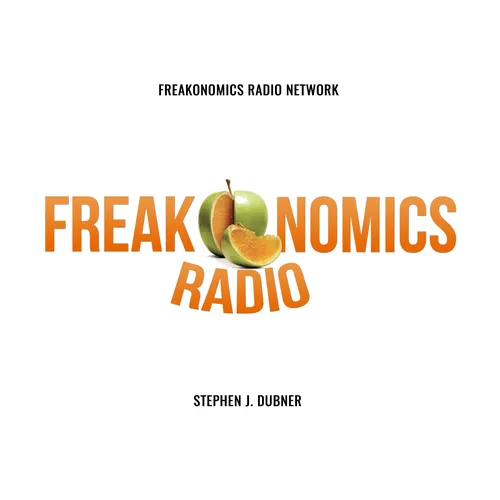
Freakonomics Radio
Freakonomics co-author Stephen J. Dubner uncovers the hidden side of everything. Why is it safer to fly in an airplane than drive a car? How do we decide whom to marry? Why is the media so full of bad news? Also: things you never knew you wanted to know about wolves, bananas, pollution, search engines, and the quirks of human behavior.
To get every show in the Freakonomics Radio Network without ads and a monthly bonus episode of Freakonomics Radio, start a free trial for SiriusXM Podcasts+ on Apple Podcasts or by visiting siriusxm.com/podcastsplus.
- Update frequency
- every 5 days
- Average duration
- 41 minutes
- Episodes
- 857
- Years Active
- 2010 - 2025

367. The Future of Meat
Global demand for beef, chicken, and pork continues to rise. So do concerns about environmental and other costs. Will reconciling these two forces be possible — or, even better, Impossible™?

366. This Economist Predicted the Last Crisis. What’s the Next One?
In 2005, Raghuram Rajan said the financial system was at risk “of a catastrophic meltdown.” After stints at the I.M.F. and India’s central bank, he sees another potential crisis — and he offers a sol…

Extra: Domonique Foxworth Full Interview
Stephen Dubner’s conversation with the former N.F.L. player, union official, and all-around sports thinker, recorded for our “Hidden Side of Sports” series.

365. Not Just Another Labor Force
If you think talent and hard work give top athletes all the leverage to succeed, think again. As employees in the Sports-Industrial Complex, they’ve got a tight earnings window, a high injury rate, l…

Extra: Mark Cuban Full Interview
A conversation with the Shark Tank star, entrepreneur, and Dallas Mavericks owner recorded for the Freakonomics Radio series “The Hidden Side of Sports.”

364. Inside the Sports-Industrial Complex
For most of us, the athletes are what make sports interesting. But if you own the team or run the league, your players are essentially very expensive migrant workers who eat into your profits. We tal…

Extra: Mark Teixeira Full Interview
A conversation with former Major League Baseball player and current ESPN analyst Mark Teixeira, recorded for the Freakonomics Radio series “The Hidden Side of Sports.”

363. Think Like a Winner
Great athletes aren’t just great at the physical stuff. They’ve also learned how to handle pressure, overcome fear, and stay focused. Here’s the good news: you don’t have to be an athlete to use what…

Hacking the World Bank (Update)
Jim Yong Kim has an unorthodox background for a World Bank president — and his reign has been just as unorthodox. He has just announced he’s stepping down, well before his term is over; we recorded t…

362. Why Is This Man Running for President?
In the American Dream sweepstakes, Andrew Yang was a pretty big winner. But for every winner, he came to realize, there are thousands upon thousands of losers — a “war on normal people,” he calls it.…

How to Be Happy (Rebroadcast)
The U.N.’s World Happiness Report — created to curtail our unhealthy obsession with G.D.P. — is dominated every year by the Nordic countries. We head to Denmark to learn the secrets of this happiness…

How to Win Games and Beat People (Rebroadcast)
Games are as old as civilization itself, and some people think they have huge social value regardless of whether you win or lose. Tom Whipple is not one of those people. That’s why he consulted an ar…

People Aren’t Dumb. The World Is Hard. (Rebroadcast)
You wouldn’t think you could win a Nobel Prize for showing that humans tend to make irrational decisions. But that’s what Richard Thaler has done. The founder of behavioral economics describes his un…

Freakonomics Radio Live: “We Thought of a Way to Manipulate Your Perception of Time.”
We learn how to be less impatient, how to tell fake news from real, and the simple trick that nurses used to make better predictions than doctors. Journalist Manoush Zomorodi co-hosts; our real-time …

Freakonomics Radio Live: “Where Does Fear Live in the Brain?”
Our co-host is comedian Christian Finnegan, and we learn: the difference between danger and fear; the role of clouds in climate change; and why (and when) politicians are bad at math. Washington Post…

Freakonomics Radio Live: “The World’s a Mess. But Oysters, They Hold it Down.”
Celebrity chef Alex Guarnaschelli joins us to co-host an evening of delicious fact-finding: where a trillion oysters went, whether a soda tax can work, and how beer helped build an empire. Washington…

361. Freakonomics Radio Live: “Jesus Could Have Been a Pigeon.”
Our co-host is Grit author Angela Duckworth, and we learn fascinating, Freakonomical facts from a parade of guests. For instance: what we all get wrong about Darwin; what an iPod has in common with t…

360. Is the Protestant Work Ethic Real?
In the early 20th century, Max Weber argued that Protestantism created wealth. Finally, there are data to prove if he was right. All it took were some missionary experiments in the Philippines and a …

359. Should America Be Run by … Trader Joe’s?
The quirky little grocery chain with California roots and German ownership has a lot to teach all of us about choice architecture, efficiency, frugality, collaboration, and team spirit.

There’s a War on Sugar. Is It Justified? (Rebroadcast)
Some people argue that sugar should be regulated, like alcohol and tobacco, on the grounds that it’s addictive and toxic. How much sense does that make? We hear from a regulatory advocate, an evidenc…